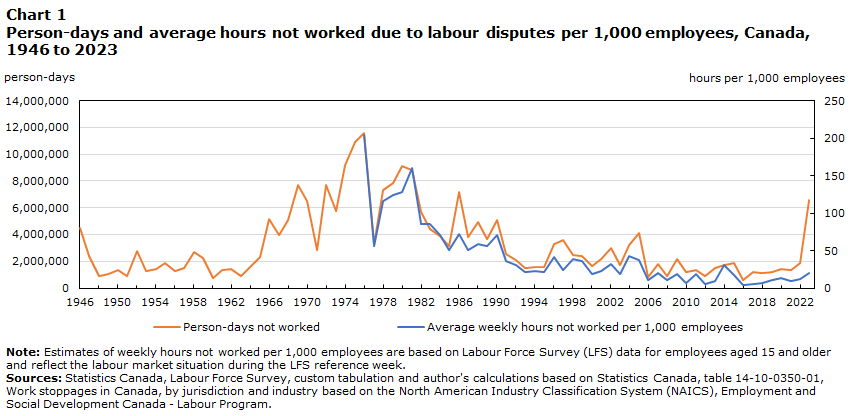
Are dependent contractors permitted? Major overhaul to Canada Labour Code brings strict new limits – and raises key questions – for unionized employers

“It's a really significant change for federally regulated employers.”
So says Chris Pigott, partner at Fasken Martineau DuMoulin, in discussing the amendments to the Canada Labour Code set to take effect.
Federally regulated employers in Canada will face a seismic shift in labour law as Bill C-58 comes into force on June 20, 2025.
The legislation introduces a sweeping ban on the use of replacement workers during strikes and lockouts, along with new obligations around essential services agreements.
That’s going to be a major challenge for federal workplaces — such as airlines, railways, telecom companies — that are 24-7 operations, says Pigott.
“Generally speaking, even if there is a strike or lockout that shuts down a federal workplace today, there are some replacement workers working behind the scenes to keep the bare bones of the operation running,” he says.
“That's going to become a lot more difficult after the legislation comes into force next month. And I don't think a lot of thought has been given by, frankly, the government, as to how this is actually going to impact critical national infrastructure on the ground.”
Similar legislation that’s been in place for years in Quebec and B.C. may serve as a cautionary tale, says Pigott: “The number of strikes has increased, and the length of strikes has increased… That’s not a good sign for what could happen in the federal sector.”
It’s a big change coming forward, says Alessandra Pecoraro, partner at Miller Thomson in Montreal, “which obviously is seen as a big win for the union, and gravely concerns the employers… the impacts could be very severe if there are long strikes and lockouts.”
When Bill C-58 comes into force, it's going to shift to a framework in which employers have a very limited ability to use replacement workers, says Pigott.
For example, the following categories of workers are going to be generally prohibited from working during a strike or lockout: any employee and manager who's been hired after notice of collective notice to bargain has been given, he says, “which is often long before — months or years before — a strike or lockout is in sight.”
An employer will also be prohibited from using any temporary agency workers and non-management employees who work at another location. Plus, crossing the picket line by bargaining unit employees is going to be prohibited, says Pigott.
“These will all be fundamental changes with respect to who can and cannot work during a federal work stoppage.”
One area that raises debate between Pecoraro and Piggot is dependent contractors, and whether they will also be banned under the new legislation.
Section 94(4) of Bill C-58 prohibits employers from using the following individuals to perform the work of striking or locked-out employees, including “any contractor, other than a dependent contractor, or any employee of another employer,” says Pecoraro.
But dependent contractors are also included in the definition of "employee" under Section 3 of the Canada Labour Code (CLC): “Employee means any person employed by an employer and includes a dependent contractor.”
The language in the legislation opens the door for employers to legally use dependent contractors as replacement workers, provided they meet the narrow definition under the CLC, she says.
“Theoretically, this means that dependent contractors are excluded from the prohibition.”
But Pecoraro concedes that applying the definition is nuanced:
“The determination of whether someone qualifies as a dependent contractor under the CLC is not straightforward. It requires a contextual analysis of the economic dependence and the degree of control exercised over the performance of the work.”
Pigott says that dependent contractors are included under the "employee" category in subsection 4(a), which makes their explicit exclusion from 4(b) redundant, not permissive:
“Subsection 4(b) carves out ‘dependent contractors’ because, if it did not, dependent contractors would technically be covered by both subsection 4(a) (as ‘employees’) and subsection 4(b) (as a type of ‘contractor’),” he says.
“This would have been a significant and problematic ambiguity in the legislation.”
It makes sense that dependent contractors and employees would be treated the same in the replacement worker context, says Pigott.
“They are generally treated the same under Part I of the Code, and there is no reason why – either practically or on a reading of the legislation – dependent contractors would be permitted to continue working during a strike or lockout but employees would not.”
He also warns of the practical consequences of the alternate interpretation:
“An interpretation that treated them differently… could incent employers to reduce their employee headcount and replace them with dependent contractors so the employer could continue operating during a work stoppage.”
But Pigott also acknowledges the ambiguity: “This issue is not entirely clear and may need to be worked through in litigation.”
While employers will be prohibited from using a wide range of individuals to perform the work of striking or locked-out employees, limited exceptions exist. Employers may use replacement workers only to prevent imminent threats to life, health, safety or to avert serious damage to property or the environment.
But there is a caveat, says Pecoraro.
“These exceptions are really only to maintain what is already there, so ...in other words, conservational purposes, and it's not to allow these, obviously, exceptions, to be used to continue to operate your business while there's a strike and a lockout.”
Even then, members of the bargaining unit must first be offered the opportunity to perform the necessary tasks, mirroring similar legislation in Quebec and B.C., she says.

Both lawyers agree the legislation will apply uniformly across Canada, regardless of an employee’s province or remote status.
“If you're federally regulated, it really doesn't matter which province you're in,” says Pecoraro.
“For instance, if federally regulated unionized employees associated with an Ontario establishment are on strike or locked out, the employer likely cannot rely on employees from another province to perform the struck work. Doing so would amount to indirectly accomplishing what is directly prohibited under the legislation.”
The bill also imposes new requirements on employers and unions to reach a maintenance of activities agreement within 15 days of giving notice to bargain. If no agreement is reached, parties must apply to the Canada Industrial Relations Board (CIRB), which will be required to issue a decision within 82 days.
“[That] does not give either the employer or union a lot of time to try to reach agreement on who is essential to an operation and should continue working and during a strike or lockout,” says Pigott.
“And, frankly, today, most employers and unions and most workplaces don't even bother thinking about maintenance of activities or essential services agreements. They're just a non-issue.”
With the new changes, there's an added incentive on the part of the employer to try to reach an agreement to avoid the restrictions, he says.
“The challenge is that unions will have virtually no incentive to try to reach agreement, because they know that in the absence of an agreement, you're stuck with the restrictions in the legislation, which are really broad.”
The 15-day timeline will also be challenging for the CIRB because it already faces a huge backlog of cases, says Pigott.
“Its capacity to deal with disputes over whether or not some employees should keep working during a work stoppages is going to be really limited.”
HR and employer will want to keep in mind that the stakes for non-compliance are high.
“The penalties for violating the legislation are substantial,” says Pigott, citing a limit or cap of $100,000 fine per day if you use the services of a prohibited worker.
Once a complaint for violation of anti-scab provisions is filed with the CIRB, it must render a decision in a “timely fashion,” says Pecoraro, which will depend on the regulations being rolled out within the next coming months.
“The board also has the administrative authority to impose other financial fines so there are significant impacts or consequences if an employer violates the anti-scab provision.”
With less than a month until Bill C-58 takes effect, federally regulated employers are urged to assess workforce structures, initiate early discussions with unions, and prepare for a very different environment in labour relations.
Both experts urge HR leaders to begin planning immediately.
“They should start thinking of what would happen if a strike or a lockout was called, what they considered to be the essential services,” Pecoraro says.
They should also start looking at dates when it comes to renewing collective agreements, she says.
“One of the major points of this bill is to bring employers and the union to reflect in advance as to how they can come to an agreement quicker.”
That means having conversations with the union, says Pecoraro, to cover questions such as: “’What provisions do we agree on to avoid the situation where we come to a strike or lockout?’ It's not always possible, of course, but if it can be avoided, that's the best case scenario.”
However, Pigott notes that the recent election of Prime Minister Mark Carney could be a factor.
“It will be interesting to see, now that we have a new government in place that's much more focused on the economy, whether any changes are made — and I think changes certainly would be most welcomed by the employer community in the federal sector.”